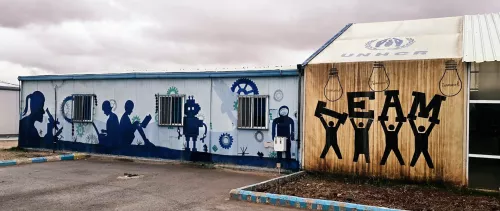
The rapid development of artificial intelligence (AI) and its enormous potential to benefit humanity took centre stage at the AI for Good Global Summit at Geneva’s International Conference Centre – with a particular focus on the fundamental role of AI in getting the United Nations Sustainable Development Goals back on track by 2030.
“ITU was there when the telegraph took off… when satellites went into space, … when the first mobile phone call was made,” said ITU Secretary-General Bogdan-Martin in her opening keynote speech. “These defining moments have changed the world and they brought us together.”
The world is at yet another defining moment in history, a moment that calls for collaborative action.
Over 40 UN agencies have made AI for Good UN’s primary platform for AI
In a recent ITU report, United Nations agencies outlined more than 280 projects harnessing AI to mitigate climate change, transform education, fight hunger, eliminate poverty, and tackle all the other pressing issues covered by the SDGs.
ITU and the World Health Organization (WHO) with newly joined World Intellectual Property Organization (WIPO) presented their ground-breaking Global Initiative on AI for Health at the summit.
“The future of healthcare is digital,” noted Dr Tedros Adhanom Ghebreyesus, WHO Director-General. “While this new technology holds great potential, we must be cognisant of governance, ethics and equity.”
“This morning, I listened to statements made by WIPO Member States,” said Edward Kwakwa, WIPO Assistant Director-General. “They all talk about artificial intelligence, about global health and they all talk about intellectual property.”
Guardrails for generative AI needed
“As any technology that humanity has created, it needs some guardrails, some rules of the road so that the good prevails over the risky,” said Tomas Lamanauskas, ITU Deputy Secretary-General. “We have governments, UN sister agencies, companies, civil society and academia here at the Summit to put their brains together to find solutions.”
At a United Nations Roundtable, participants agreed on the need for guardrails for generative AI and the importance of democratizing opportunities without spreading risks.
Addressing challenges such as improved transparency, predictability and liability issues is critical, they agreed, as is ensuring increased access to AI for women and responsible research, design and deployment. More widespread AI literacy and policy discussions on AI in different languages and cultures are also needed.
“Many of the questions that we have on AI have no answers yet. Should we hit pause on giant AI experiments? Will we control AI more than it controls us? And will AI help humanity, or destroy it?,” asked Bogdan-Martin.
“Even tech leaders and experts are warning of the potential dangers of AI, from the development and use of autonomous lethal weapons, to turbocharging mis- and disinformation that undermine democracy,” underlined United Nations Secretary-General António Guterres in a video message. “But AI also has the potential for enormous good. Its powerful tools could drive forward the 2030 Agenda and the Sustainable Development Goals.”
“Talking about several AI initiatives around the world for improving activities in agriculture, aquaculture and health care as well as disaster warning management – data is crucial in it all,” pointed out Werner Vogels, Chief Technology Officer and Vice President of Amazon.
“Things are happening much faster than people expected,” warned thought leader Yuval Noah Harari in a remote conversation with Nicholas Thompson, CEO of The Atlantic. For Harari, AI is both the most dangerous technology ever created and potentially the most beneficial, but “we don’t have the regulatory bodies in place, and we need to establish them as soon as possible.”
World’s largest gathering of humanoid robots
Dozens of robots, including several humanoids, showcased their potential to contribute to the Sustainable Development Goals.
From assisting in recovery and wellness to firefighting, supporting farmers, improving teaching in schools, keeping people safe in industrial settings and providing comfort and support – robots are enriching our lives.
Thought leaders at the summit also shared insights on how AI, satellites and robotics are contributing to space sustainability: humanity’s capacity to use outer space peacefully over the long term for the socioeconomic benefit of all.
“A mission like [Mars Sample Return Mission in 2030] is really possible because of global collaboration, but also the autonomous capabilities that we are advancing,” said Vandi Verma, Deputy Manager for Mobility and Robotics Systems at NASA Jet Propulsion Laboratory. “It’s a mission entirely driven by robots, which need to be able to work robustly. Taking the latest innovations in AI and deploying them in the robotic scenario is what we are hoping to do.”
“The era of generative AI is just beginning,” concluded Bogdan-Martin. “And the future of AI has yet to be written. So together, let’s make it innovative, let’s make it safe, and let’s make it responsible for all.”
Resources
AI for Good YouTube playlist:
AI for Good Flickr album with photos.

